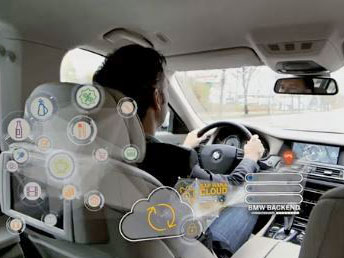Buying a Car: Digital Services Beat Brand

According to Bitkom, three out of four Germans pay attention to the compatibility of their car with their smartphone, with brand considerations clearly trailing behind.
Traditional criteria for car purchases, such as brand or design, now hold significantly less importance for many Germans compared to digital offerings and services within the vehicle. Only 64% state that the vehicle’s design is important to them, down from 68% in 2022. Similarly, the importance of brand has decreased to 53% (from 59% in 2022). Meanwhile, 86% prioritize navigation services integrated into the vehicle, 83% value new driver assistance systems like parking assistance or traffic jam assist, and 76% desire services based on vehicle data such as repair instructions in case of wear and tear. Just as many base their purchasing decision on the compatibility of the user interface in the cockpit with their smartphone operating system.
These findings stem from a survey conducted on behalf of the digital association Bitkom among 1,003 individuals in Germany aged 16 and above. Bitkom CEO Bernhard Rohleder remarks, “People expect cars to be smart, with digital technologies seamlessly integrated into the vehicle. Car manufacturers have acknowledged this shift. Moving forward, the goal must be to design cars as digital devices from the outset, embracing a digital-first approach.”
Smartphone compatibility
Other digital services rank higher on the wish list of Germans when purchasing a car than brand and design. For instance, 70 percent consider online updates without a visit to the garage to be important, while 66 percent desire new services such as traffic information based on car-to-car communication. Additionally, 66 percent also seek Internet access for entertainment and communication within the vehicle.
The significance of digital technologies within vehicles is likely to further increase in the future. Currently, 87% of individuals aged 16 to 29 assert that smartphone compatibility with their vehicle is important to them, whereas brand relevance stands at just 39% within this age group.
However, the most pivotal criteria when purchasing a car remain the classics: safety (100 percent), general comfort (96 percent), purchase price (94 percent), fuel consumption, and environmental characteristics (93 percent). Additionally, the type of drive (89 percent) and state subsidies (87 percent) hold importance for buyers. Engine performance only plays a significant role for 72 percent.